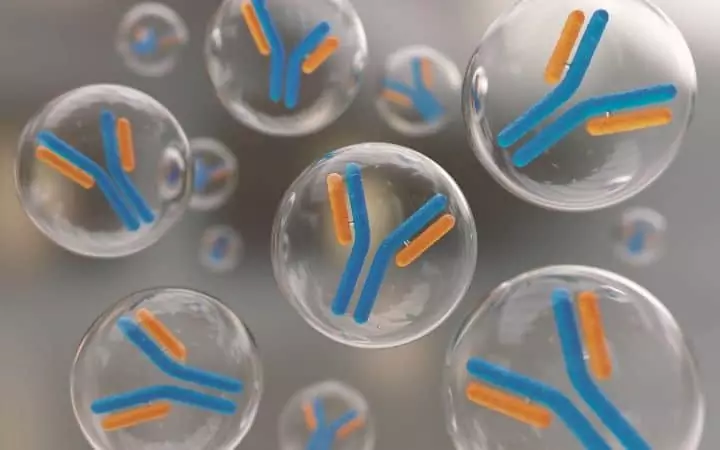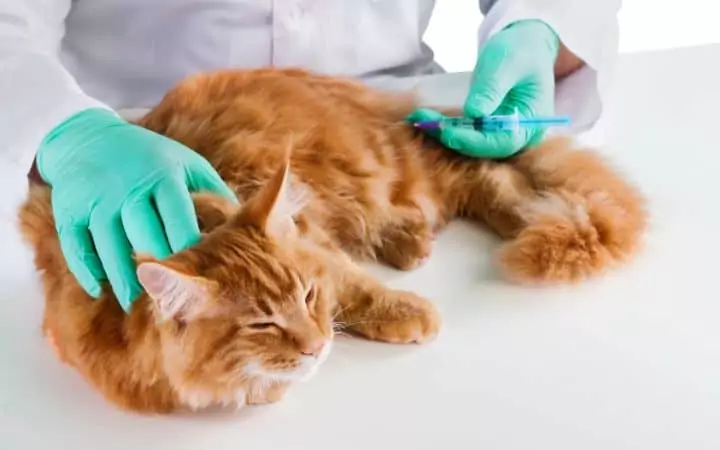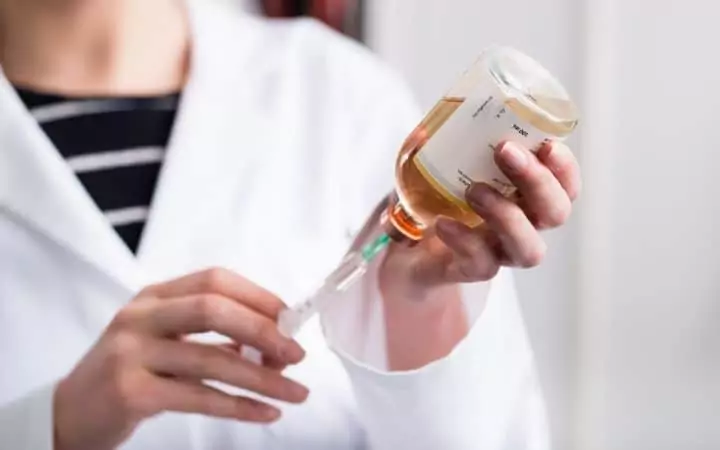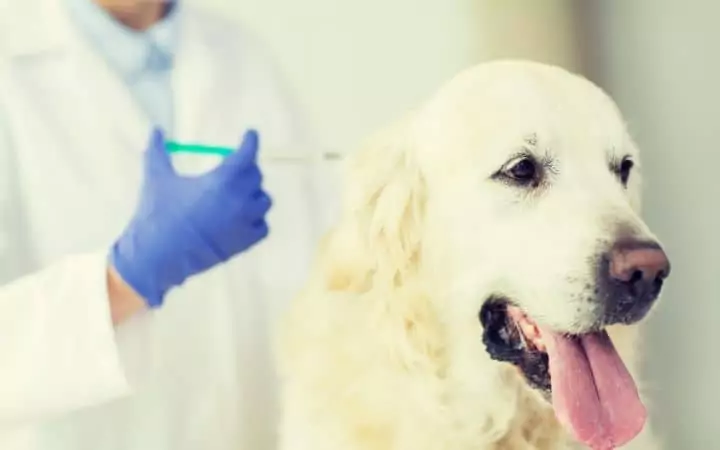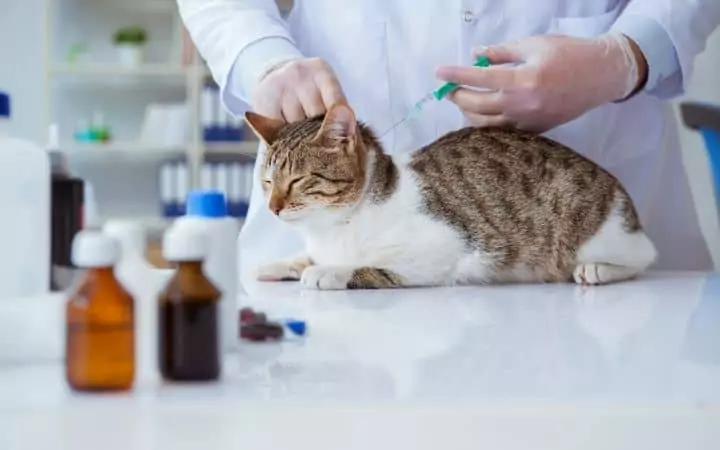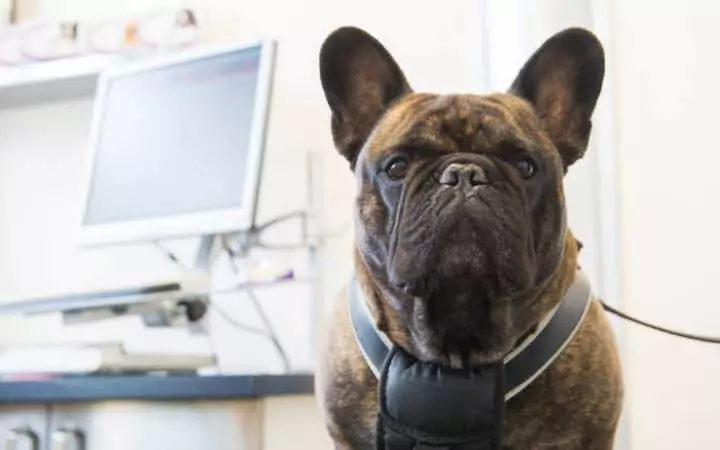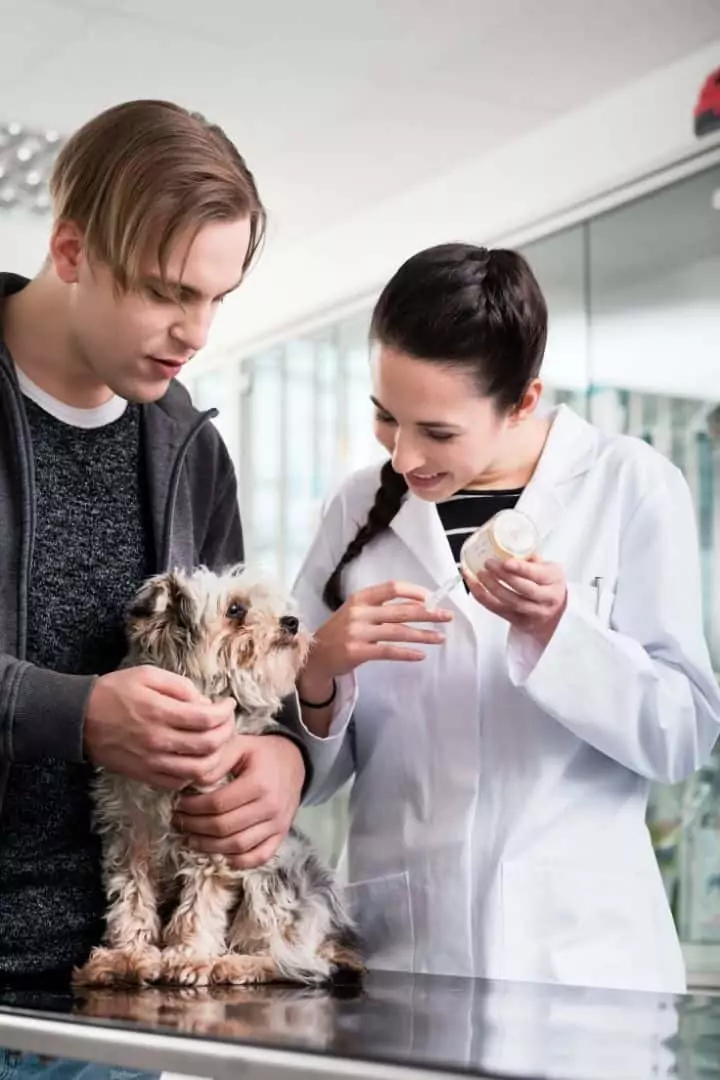Vaccines play an important role in preventive healthcare for humans and pets.
According to the American Veterinary Medical Association, vaccines are “products designed to trigger protective immune responses and prepare the immune system to fight future infections from disease-causing agents. “
A vaccine schedule is one of the first things your vet may walk you through when you adopt a new furry family member.
Annual boosters vaccinations are a controversial topic in veterinary medicine. Your veterinarian will advise you on the best vaccine protocol based on your pet’s requirements and needs.
If you’re a pet advocate and would like to know more than just general information, you’re in the right place. In this article, we discuss essential knowledge about vaccines, including how vaccines work, types of vaccines, and the core vaccines for pets.
Terms you need to know to understand how vaccines work
What is an antibody?
Antibodies are proteins produced in the immune system by white blood called B cells when an infection enters the body. The functions of antibodies are:
- To label diseases so that other cells can destroy them
- Once antibodies are created, they will remain in the body in case the infection appears again. This is to stop the virus from going into its target.
What is Immunity?
Immunity occurs when the immune system learns the best approach to attack a virus. As explained above, when infection enters your pet’s body, the immune system recognizes the disease and reacts by producing antibodies. If the toxin enters the body again, the immune system will know how to respond promptly and efficiently as the specific antibodies are already there.
What is an antigen?
Antigens are substances that produce an immune response in the body. Every virus, bacteria, and disease has its own antigens that trigger the production of specific antibodies.
Vaccines carry the modified or killed virus, which does not cause the disease when it enters the body, but it still contains the antigen that causes the immune response.
How do vaccines work?
When the vaccine is introduced to the body, it temporarily stimulates a response to the agent within the vaccine. The immune system can safely recognize the antigen and produce antibodies to keep them for the future.
Let’s say your healthy pup had all his vaccination shots against parvovirus. If your pet is eventually exposed to parvovirus, the immune system will know what to do to fight it.
The Herd Immunity Imperative
Herd immunity is a relevant concept when it comes to the benefits of vaccinations.
Vaccinations can protect an entire community against zoonotic diseases and can also prevent many deadly diseases transmitted from animal to animal. It refers to the reduced level of risk and spread of the disease when a satisfactory amount of animals are vaccinated in an area.
Types of Vaccines
Vaccinations can be divided into different categories regarding the approach that was taken to develop the vaccine. The main types are:
- Live attenuated vaccines: when the virus in the vaccine is modified to not cause the disease. An advantage of this vaccine is that it can have a long-lasting effect performed by fewer doses.
- Inactivated vaccines: when the virus is killed with heat or chemicals and is combined with other components. These vaccines are known to be safer than live vaccines as the virus is killed, and it is unlikely to provoke disease due to a remaining disease-causing component.
- Recombinant vaccines: are made using genetic engineering to produce an immune response. One of the advantages is that it minimizes the side effects post-vaccination.
Your pet must be in a good health condition at the time of vaccination to develop the correct immune response.
Vaccinations can also be divided into “core” and “non-core”:
- Core vaccines: are considered vital and globally recommended because of the widespread or severity of the disease. They can vary depending on the country you live in. We will look at the core vaccinations for dogs and cats in a bit.
- Non-Core or lifestyle vaccines: are optional and are entirely based on the risk of exposure, including geographical location and lifestyle. For example, if your pet often goes to kennels, your veterinarian may advise vaccinations against kennel cough and some kennels will ask for a proof of this vaccine. This vaccine does not cover all strains of kennel cough; this means that your pooch may still get it.
Questions that your vet may ask to determine if your pet needs a non-core vaccine include:
- Is your pet indoor or outdoor?
- Do you live in an urban area or the countryside?
- Does your pet participate in cats/dogs show?
- Do you have any plans to travel abroad with your pet?
- Does your dog stay in kennels?
Non-core vaccines for dogs and cats
We will look at two different parts of the world to see the differences between non-core vaccines and core vaccines, depending on the location.
Non-core vaccines for cats in the US are:
The lifestyle vaccines for feline companions in the UK are:
- Chlamydophila felis
- Bordetella bronchiseptica
- Rabies (a legal requirement for cats returning to the UK or traveling abroad)
- Feline leukemia virus (core vaccine for outdoor cats)
The canine non-core vaccines in the US are:
- Bordetella bronchiseptica and parainfluenza virus (combined vaccine)
- Canine Influenza Virus-H3N8
- Canine Influenza Virus-H3N2
- Leptospira (leptospirosis)
- Borrelia burgdorferi (Lyme disease)
- Crotalus atrox
The non-core vaccines for dogs in the UK are:
- Bordetella bronchiseptica and canine parainfluenza virus
- Leishmaniasis
- Rabies (a legal requirement for dogs returning to the UK or traveling abroad)
- Canine Herpes Virus
- Borrelia burgodorferi (Lyme disease)
Which are the necessary vaccines for pets (dogs/cats)?
The core vaccines for cats in the US are:
- Feline herpesvirus 1, feline calicivirus and feline panleukopenia virus
- Feline leukemia virus
- Feline rabies virus
The feline core vaccines in the UK include:
- Feline panleukopenia virus
- Feline calicivirus and herpes virus
The necessary vaccines for dogs in the US are:
- Rabies
- Canine distemper virus, canine parvovirus, canine adenovirus and parainfluenza (combined vaccine)
The canine core vaccines in the UK are:
- Canine distemper virus, canine adenovirus, canine parvovirus
- Leptospirosis
Why do Vaccines Require More Than One Dose?
Your pet’s body needs time to respond to vaccinations. Most vaccinations require three vaccinations shots in intervals of three weeks apart, depending on the age and overall health of the dog or cat. Puppies and kittens should start receiving a course of vaccinations at around six to eight weeks of age.
How long do vaccines last?
The duration of the vaccines’ effect varies according to the circumstances of your pet, the disease itself, and the manufacturer of the vaccine. Some vaccines can last for three years, and others like leptospirosis only last for a year.
Follow your vet’s advice to keep the optimum protection for your furry companion.
Summary
Vaccines are given to your furry family member through injection, but some are available as a spray that your vet can administer up the pet’s nose. There are some adverse effects to consider, such as diarrhea, vomiting, loss of appetite, seizures, and in rare cases, cats can develop a malignant tumor in the injection site. However, most vaccines are relatively safe and are an important tool in preventive care, saving many lives! Always make an informed and appropriate decision with your vet about the best protocol for your pet.
If you live in Europe, we have two entire posts discussing vaccination schedules for cats and dogs. Check them out!

